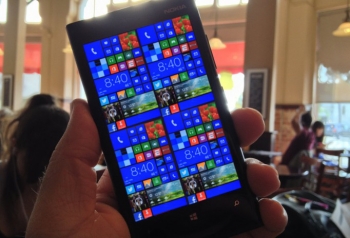Windows Phone 8.1 is not a new operating system but more a refinement of its predecessor that is steadily gaining market share in the BYOD enterprise segment.
If Phone 8.1 is delayed that is not great news for Nokia and HTC. Both companies have developed prototypes of their flagship phones that utilise 8.1’s reported ability to support larger, higher resolution screens, quad core processors, more memory and new features (like Wi-Fi AC). Both need to keep rolling out leading edge models that will take sales from Samsung’s Galaxy S4 (and all its new variants) and the iPhone 5S (or whatever it is called) rumoured for release shortly.
Qualcomm has already announced new quad-core chipsets that support Windows Phone 8.1. One based on a new Krait 300 quad-core chipset with Adreno 305 GPU and the other a Snapdragon 400 chipset that has a 1.2GHz quad-core CPU with LTE support.
Windows Phone 8 users will be upgraded free via the Windows Update service so it is not as if the delay will impact on them.
|
|
Opinion
After having spent several weeks with Apple iPhone, BlackBerry Z10, Samsung Galaxy S4 and Nokia’s 920 I decided that I preferred the Windows 8 interface for my own needs. It had a little to do with my personal taste too – I liked the big red Nokia. Conversely my wife prefers the Samsung S4 and my now adult offspring the Apple iPhone 5 and the BlackBerry Z10. How is that for diversity?
I concluded that all operating systems were fine for all typical applications and I could live happily with any of them and that it is the crux. It is what people get used to use over any other factor.
But the smartphone war seems to be about style and lifestyle marketing. You have an Apple because you are cool and can afford one, a Galaxy because you want a life companion, a BlackBerry because you are an uber business supremo and a Windows Phone because you grew up with Windows and are comfortable with that.
I think four OS can survive and manufacturers will all have to work out how to be profitable in the niches they have carved for themselves.
My concern is now more about the methods they use to extract the highest average revenue per unit (ARPU) and that is includes advertising served to phones, manipulation of search results and who knows what other information being collected and being sacrificed to the advertising dollar.
The gradual tsunami about privacy is starting to swell.



































